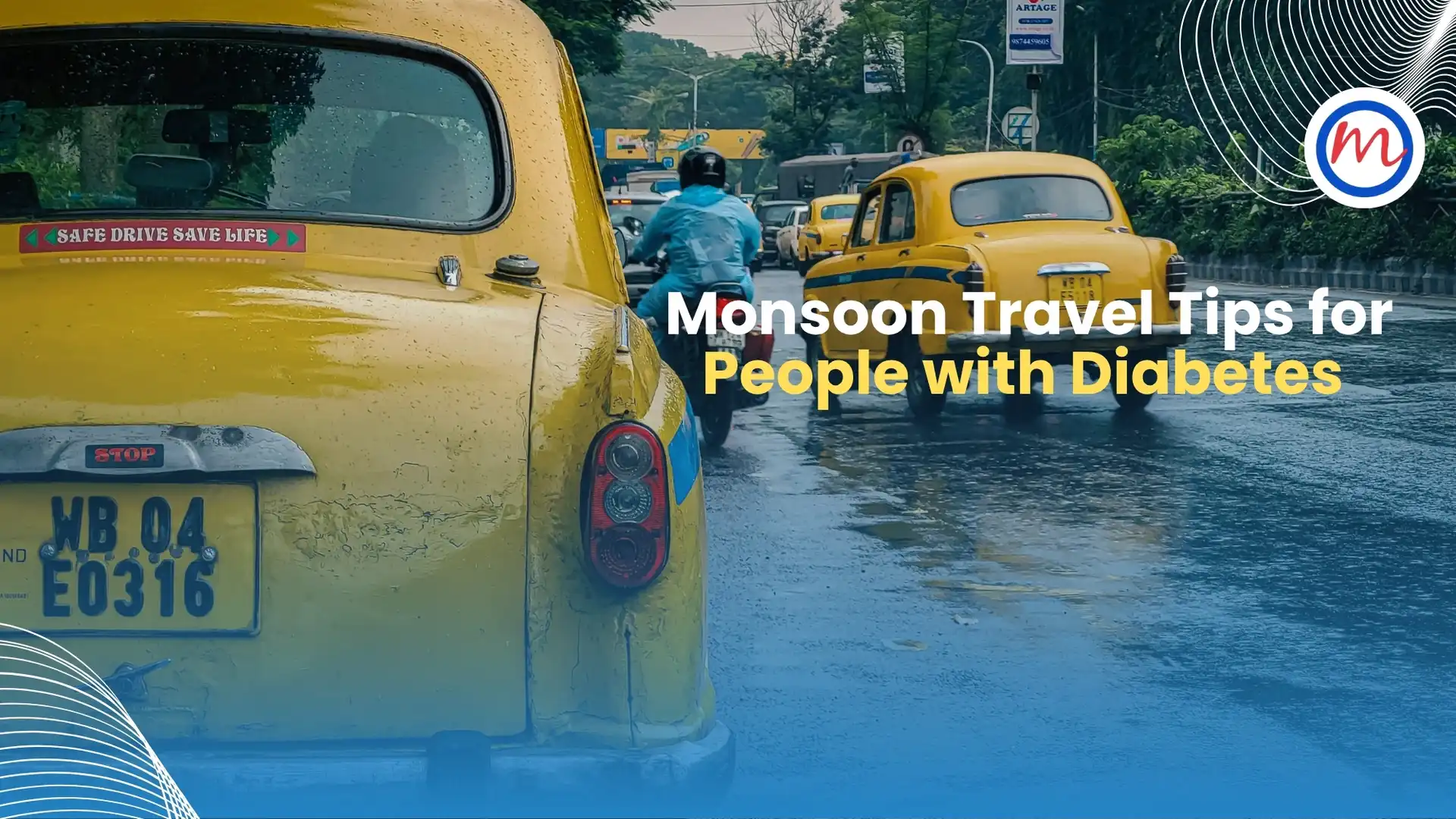Monsoon Travel Tips for People with Diabetes
Travelling during the monsoon can be enjoyable, but it comes with its own set of challenges, especially for people with diabetes. From fluctuating blood sugars to damp clothes and missed meals, monsoon travel needs special care and smart planning.
Whether it’s a short family trip, a temple visit or work travel, you can have a safe and stress-free journey by preparing ahead and taking a few extra precautions. Managing your health during the rainy season while on the move involves staying consistent with your diabetes care routine, planning for emergencies, and protecting yourself against infections. This guide walks you through every stage of travel, from preparation to return.
Why Monsoon Travel Needs Extra Precautions for People with Diabetes
Travelling often disrupts the normal routine. Changes in diet, sleep, physical activity and stress can all affect blood sugar levels. During the monsoon, these challenges are further magnified. Here are a few common concerns:
- Higher risk of infections such as urinary tract infections, colds, food poisoning or foot infections due to wet weather and exposure to contaminated food or water.
- Greater likelihood of wet or injured feet, especially when walking in damp areas or during pilgrimages.
- Unavailability of healthy food options leads to skipped meals or dependence on processed or fried foods.
- Missed medication doses or irregular monitoring, particularly if you forget to carry your glucose meter or if your device fails due to humidity.
When you live with diabetes, even minor infections or delays in care can escalate into complications. That’s why planning ahead is essential.
Don’t take chances. Plan ahead with the right supplies and precautions.
Before You Travel: Monsoon Travel Tips for People with Diabetes
-
Consult Your Doctor:
Before you travel, schedule an appointment with your doctor to get travel tips, especially if:
- You have had fluctuating sugar levels in recent weeks
- You have foot ulcers, kidney issues or have been unwell
- You are travelling to a high-altitude or humid area
Your doctor can help adjust medications, recommend necessary tests and provide emergency advice.
https://drmohans.com/book-an-appointment/
-
Pack a Diabetes Travel Kit
Ensure you have everything needed to manage your diabetes while travelling. Your kit should include:
- Glucose meter, strips and extra batteries
- Insulin pens/syringes with cold storage if necessary
- All oral medications in a waterproof pouch
- Sugar tablets or glucose powder for emergencies
- A detailed prescription and doctor’s note
- Emergency contact card
- Hand sanitiser, antifungal powder and face masks
https://drmohans.com/travel-checklist-for-people-with-diabetes/
-
Plan for Food and Water
Food options on the road may not always be diabetes-friendly. It is wise to:
- Carry snacks like roasted chana, unsalted almonds, peanuts or homemade millet laddoos
- Avoid uncooked or packaged snacks that may be stale or contaminated
- Always carry boiled water or packaged drinking water
- Stay hydrated and avoid sugary beverages
https://drmohans.com/healthy-snacks-for-people-with-diabetes/
While Travelling: Stay Safe in Monsoon Weather
Keep Feet Dry and Protected
People with diabetes are at higher risk for foot infections, especially when exposed to wet or muddy conditions. To prevent this:
- Wear waterproof shoes or sandals with good grip
- Choose moisture-wicking socks and change them twice a day
- Avoid walking barefoot in temples, hotel rooms or damp places
- Check your feet every morning and night for any signs of injury, cuts or redness
Read more: Foot Care for People with Diabetes
Eat Light and Hygienic
Food poisoning and stomach infections are common during the monsoon. Choose meals that are:
- Freshly cooked and served hot
- Free from raw garnishes like cut onions or chutneys
- Prepared in hygienic places—avoid street food when possible
- Easy on digestion, such as khichdi, vegetable upma or soft-cooked lentils
Monitor Blood Sugar Regularly
Travelling stress, unpredictable meal times and new foods may cause your blood sugar to spike or drop. Be proactive:
- Check blood sugar before travel, after long walks or if you feel dizzy or tired
- Stick to your prescribed meal and medicine timings
- Always carry a small card with your diabetes history and emergency plan
Get tips on tracking sugar: Self-Monitoring of Blood Glucose
After You Return: Post-Travel Check
Once your trip is over, observe how your body feels. If you experience:
- Tiredness, increased urination, or unusual thirst
- Skin or foot infections
- Digestive discomfort
- Irregular sugar readings
Schedule a check-up to rule out any post-travel issues. Travelling exposes you to different hygiene levels, which can impact people with diabetes more quickly than others.
Enjoy the monsoon without worrying about your health. Dr. Mohan’s Diabetes Specialities Centre provides pre-travel advice, customised diet plans, emergency diabetes care and follow-up services tailored to your needs.
Book a diabetes consultation today
Find a centre near you
Explore more seasonal tips on our Diabetes Blog



